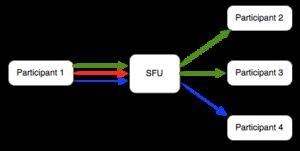If you’re new to WebRTC, Jitsi was the first open source Selective Forwarding Unit (SFU) and continues to be one of the most popular WebRTC platforms. They were in the news last week because their parent group inside Atlassian was sold off to Slack but the team clarified this does not have any impact on the Jitsi […]
Search Results for: simulcast
A playground for Simulcast without an SFU
Simulcast is one of the more interesting aspects of WebRTC for multiparty conferencing. In a nutshell, it means sending three different resolution (spatial scalability) and different frame rates (temporal scalability) at the same time. Oscar Divorra’s post contains the full details. Usually, one needs a SFU to take advantage of simulcast. But there is a […]
Optimizing video quality using Simulcast (Oscar Divorra)
Dealing with multi-party video infrastructure can be pretty daunting. The good news is the technology, products, and standards to enable economical multiparty video in WebRTC has matured quite a bit in the past few years. One of the key underlying technologies enabling some of this change is called simulcast. Simulcast has been an occasional sub-topic […]
Power-up getStats for Client Monitoring
WebRTC’s peer connection includes a getStats method that provides a variety of low-level statistics. Basic apps don’t really need to worry about these stats but many more advanced WebRTC apps use getStats for passive monitoring and even to make active changes. Extracting meaning from the getStats data is not all that straightforward. Luckily return author […]
WebRTC Plumbing with GStreamer
GStreamer is one of the oldest and most established libraries for handling media. As a core media handling element in Linux and WebKit that as launched near the turn of the century, it is not surprising that many early WebRTC projects use various pieces of it. Today, GStreamer has expanded options for helping developers plumb […]






